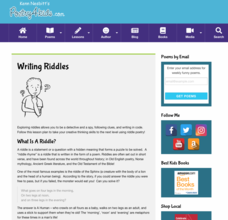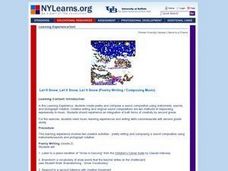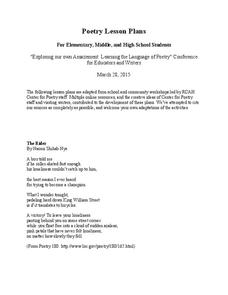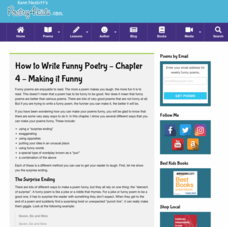Poetry4kids
How to Write Funny Poetry — Chapter 1: Writing Poetry
Do you wish you could write poetry that makes people laugh? Now you can! Check out the first chapter in a poetry writing series that emphasizes the importance of connecting subject matter to a light, bouncy meter.
Curated OER
Poetry Writing Unit: Writing a Film Poem
Film poems? To concluded a poetry unit, writers select one of their own poems and create a film that brings to life the sounds and images of their work. Included with the detailed unit plan are daily lessons, student examples, a list of...
National Council of Teachers of English
Writing Poetry with Rebus and Rhyme
Young scholars write rhyming poems using rebus. With pictures instead of words, authors create original work about things they love.
Geography 360°
Poetry Writing
Put the tips and tricks in this guide into practice in order to encourage your pupils to blossom into poets. A wonderful reference material for teachers, this packet includes definitions of poetic terms and forms as well as step-by-step...
Curated OER
The Sound of…Poetry!
Scritch, scratch, scritch. It's the sound of pupils writing poetry! Focus on sensory language and onomatopoeia with a writing lesson. After listening to some sounds, learners examine a couple of poems that include sound words and then...
Poetry4kids
How to Write an Exaggeration Poem
The best poetry writing lesson of all time is here for you! Learn all about the art of exaggeration with a lesson on exaggeration poems, which instructs students to use wild imagery to convey their message.
National Endowment for the Humanities
Emulating Emily Dickinson: Poetry Writing
High schoolers analyze mood and voice in Emily Dickinson's poem, "There's a Certain Slant of Light." After the analysis, students write a poem of their own emulating the Dickinson poem, and then write a one-page essay describing what...
Hong Kong Special Administrative Region
Learning English through Poems and Songs
Exposing learners to the power of words in poetry is a stimulating way to learn languages. Songs, haikus, rhyming words, and narrative works are all employed in a resource for teaching English as a Second Language.
Curated OER
Heartsongs Poetry by Mattie Stepanek
Use Mattie Stepanek’s Heartsongs book of poetry to inspire young poets to write about their own lives, experiences, and feelings. After reading the introduction to Mattie’s book, in which he talks about himself and his reasons for...
Little Stones
How Can Poetry Make People Think and Care?
Can beautiful words change the world? Literary scholars discover how to paint their visions of change using poetry in a series of three workshops. Each independent topic gives participants a chance to examine their feelings about...
Poetry4kids
Writing Riddles
What's got 60 eyes, 150 fingers, and an endless number of ideas? Your language arts class! Challenge young writers to come up with clever riddles with an online poetry lesson.
Poetry4kids
How to Write a Limerick
Add a little fun and fancy to English language arts with an activity that challenges scholars to write a limerick. Authors follow five rules in order to compose an original poem that contains a specific rhyme scheme.
National Endowment for the Humanities
Arabic Poetry: Guzzle a Ghazal!
Students research the evolution and cultural significance of the Arabic ghazal form of poetry. They, in groups, compose an original ghazal poem and read it aloud to the class.
Curated OER
Poetry/Music: Let It Snow!
Students create poems and sound compositions using instruments, sounds, and pictograph notation. After listening Debussy's Children's corner suite, they brainstorm a list of snow vocabulary words. Students write poems and in groups...
Poetry4kids
How to Write a “Favorite Things” List Poem
If your students made a list of their favorite things, would writing poetry be on it? After this poetry writing lesson, it might! Young writers make a list of what they like—or what they don't like—before crafting the list into...
Scholastic
Writing An Acrostic
Invite learners to introduce themselves through poetry. After brainstorming and choosing details, pupils draft two acrostic poems using their names as the base. They then evaluate and revise their poems.
Residential College in the Arts and Humanities
Poetry Lesson Plans
Need some ideas for poetry lessons? Check out this packet loaded with suggestions for elementary, middle, and high school writers.
EngageNY
End of Unit Assessment: Writing Best First Draft of “Back Again” Poem
Team up! Scholars begin working with their research teams to review the components of an effective poem. They then move on to independent work by beginning the end-of-unit assessment. Writers complete the draft of their "Back Again"...
Poetry4kids
How to Write a Concrete or “Shape” Poem
Writers compose an original shape poem. Scholars choose a subject to write about and create a visual representation by forming a corresponding picture using the poem's words.
Poetry4kids
How to Write Funny Poetry — Chapter 3: Choosing a Topic
Nothing's better than a really funny poem! Help young writers craft their funny poems with a lesson on one of the most challenging parts of writing: picking what to write about.
Curated OER
Whale Song Acrostic
What do whales sing about? Invite your class to imagine the thoughts of whales before writing acrostic poems on the topic. The plan blends together a bit of life science with plenty of opportunities for creativity and writing.
Poetry4kids
How to Write Funny Poetry — Chapter 4: Making It Funny
You've got your topic—now how do you make your poem funny? Explore ways to make a poem humorous, including puns, exaggeration, silly words, and surprising endings, with a helpful poetry lesson.
Poetry4kids
How to Write an Apology Poem
Put a silly spin on making amends with an apology poem. Budding poets think of a time they were made to apologize although they didn't mean it. They then turn their experience into a poem that offers details and ends with an explanation...
Poetry4kids
How to Write a “Backward” Poem
If you like poetry, wait till you try backward poetry! Young writers read Shel Silverstein's "Backward Bill" before writing their own funny poems that are full of backward imagery and phrasing.
Other popular searches
- Writing Poetry Onomatopoeia
- Writing Poetry Third Grade
- Writing Poetry and Prose
- Creative Writing Poetry
- Writing Poetry Rhyming Poems
- Descriptive Writing/poetry
- Writing Poetry Unit
- Writing Poetry Lesson Plans
- Poetry Writing Workshop
- Writing Concrete Poetry
- Writing Poetry On
- Teaching Poetry Writing























